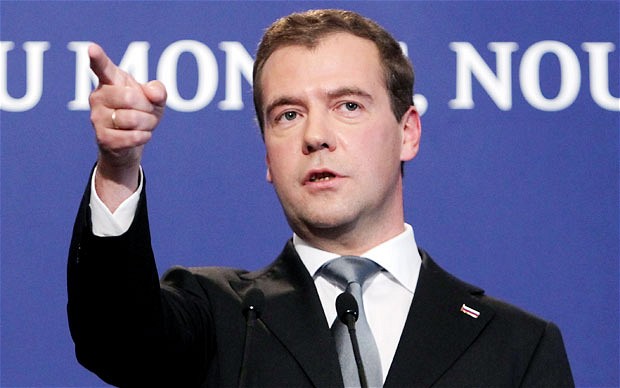
Russia to the West’s Rescue in Libya?
Publication: Eurasia Daily Monitor Volume: 8 Issue: 106
By:

As predicted from the outset of the Libya crisis (EDM, April 21, 26), Russia now officially proposes to “help” extricate the Western belligerents from their difficulties in Libya. Moreover, Moscow’s mediation is being solicited. At the G8 summit in Deauville, France on May 26 – 27, US President Barack Obama and French President Nicolas Sarkozy (the main initiators of this NATO-flagged campaign) asked Russian President Dmitry Medvedev to help facilitate Colonel Muammar Gaddafi’s departure from power and an internal Libyan political settlement. Medvedev immediately dispatched the presidential envoy for African affairs, Senator Mikhail Margelov (formerly a KGB Academy instructor) to Libya on a mediating mission. As an instant downpayment, the Kremlin leader has been deemed eligible for co-signing this summit’s “Renewed Commitment for Freedom and Democracy,” on a par with the other G8 leaders.
That wide-ranging document on global issues stipulates inter alia that “Gaddafi and the Libyan government have lost all legitimacy. He has no future in a free, democratic Libya. He must go” (www.G-8.com). Freshly authorized to facilitate a solution, Medvedev told a news conference that Moscow would negotiate with Tripoli about a possible safe-haven country for Gaddafi, and “what he can keep and what he should lose” –words redolent of Kremlin arbitration among Russian oligarchs (Interfax, May 27).
Russian officials including Foreign Minister Sergei Lavrov, Margelov, and the Duma’s international affairs committee chairman Konstantin Kosachev (as well as Moscow experts) are all recounting how Russia sought a mediator’s role from the outset of the Libya crisis. They assert with satisfaction that Russia is uniquely positioned to mediate at this juncture (Interfax, May 26-31).
By abstaining from the UN Security Council’s vote that authorized the use of force, Russia enabled the US/NATO intervention, but avoided any co-responsibility for its consequences, retaining ample leeway to criticize that intervention. Moscow was quick to call for a ceasefire and negotiations between the two Libyan sides, insisting (in contrast to the Western belligerents) that the crisis required a political solution, rather than a military one. Russia continued recognizing the Tripoli government, maintained its embassy there, and capitalized on its earlier contacts with elements in Gaddafi’s government. But Russia also opened communications with the Benghazi authorities, received Benghazi representatives in Moscow, endorsed neither side, and urged a solution acceptable to all political forces and tribes.
Concurrently, Moscow has criticized the Western belligerents’ bombing of civilian targets and the resulting humanitarian crisis in Libya. It also criticized the US/NATO operation for exceeding the terms of the UN Security Council’s resolution, urged strict compliance with that mandate, and offered to work with the African Union and the UN Secretary General’s special envoy for Libya toward a political solution. Russia reserved its position on regime-change in Libya, simply asserting that the UN resolutions do not authorize such change, but not ruling it out either. In sum, Moscow has created wide diplomatic leeway for itself, calculating the proper timing for its intercession as mediator on both levels: international and intra-Libyan.
The US/NATO operation, under way since March 19, has by now overcome the stalemate and is approaching the tipping point against Gaddafi’s forces. A complete exhaustion of Gaddafi’s army seems only a matter of weeks. Western belligerents are also attempting to orchestrate a military coup within the Tripoli authorities. They have spared Libya’s high military command from bombing, anticipating a possible deal with at least parts of the military hierarchy, in the overriding interest of post-conflict stabilization of Libya. Meanwhile, Washington as well as Paris and London cannot be certain about how much longer this would take. They feel pressed, politically and financially, to bring the military campaign to a presentable conclusion as soon as possible. That would, as an indispensable minimum, entail the departure of Gaddafi and his entourage from power. For this they are now enlisting what the G8 summiteers in Deauville termed Moscow’s “mediation services.”
On the eve of the G8 summit, Gaddafi’s Prime Minister, Al-Baghdadi Ali al-Mahmudi, had telephoned Lavrov seeking Moscow’s support for an immediate ceasefire and political negotiations without preconditions (Interfax, May 26). Clearly, Tripoli is beginning to feel exhausted.
In sum, the military and political situation presents Russia with an opportunity, albeit a fleeting one, bound to vanish when the US/NATO operation attains the tipping point on the ground. Moscow’s window of opportunity to broker a solution is now, and narrowing already. By the same token, Western belligerents’ decision to seek Moscow’s “help” is ill-timed, reflecting the same improvised decision-making that had led them into this war in the first place. A few more weeks of intensified operations (which NATO is actually planning) would have made it unnecessary to ask Moscow to facilitate Gaddafi’s departure. Moscow will reap its political rewards from the West for its unnecessary services.




